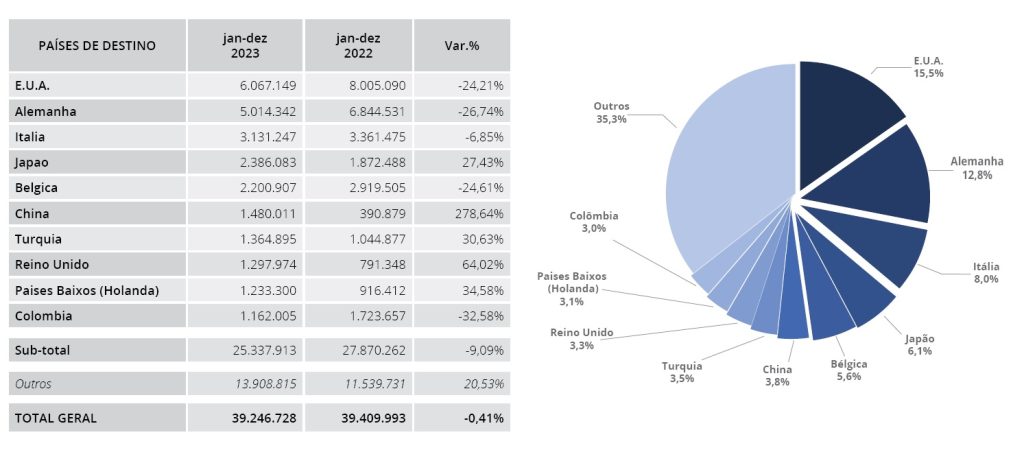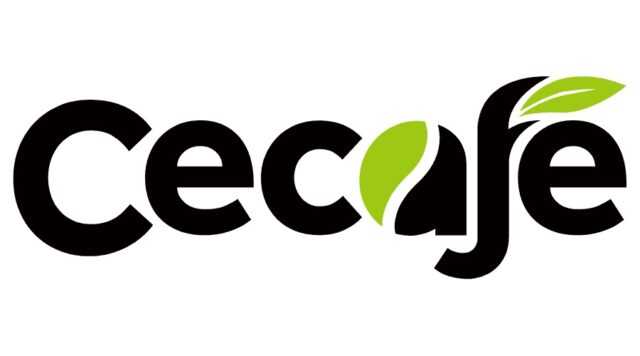MILAN – Despite a strong rebound in December, exports of all forms of coffee from Brazil were slightly down in calendar year 2023 to 39,246,728, or a 0.4% decrease over 2022, reports Cecafé in its monthly statistics.
Green coffee exports were seemingly down by 0.3% to 35,525,630 bags, of which 30,818,110 of Arabica (-9.7%), while Robusta exports surged a whopping 212% to 4,707,520 bags, slightly below an all-time high of 4.927.184 bags in 2020.
Sales of processed coffee (mostly soluble) were 1.8% down to 3,721,098 bags. Shipments to the three main destinations were lower than the previous year.
 Exports to the USA, Germany, Italy and Belgium were down by 24.2%, 26.7%, 6.9% and 24.6% respectively. On the other hand, coffee volumes exported to Japan rose by more than a quarter (+27.4%) to 2,386,083 bags.
Exports to the USA, Germany, Italy and Belgium were down by 24.2%, 26.7%, 6.9% and 24.6% respectively. On the other hand, coffee volumes exported to Japan rose by more than a quarter (+27.4%) to 2,386,083 bags.
Shipments to China more than tripled to 1,480,011 bags. Cecafe is designing ways to make it possible to have permanent product lines of Brazilian coffee in all of Luckin’s coffee shops in China, Cecafe general director Marcos Matos said at a press conference, quoted by Reuters.
 Exports to Türkiye, the UK and The Netherlands were also significantly higher.
Exports to Türkiye, the UK and The Netherlands were also significantly higher.
In December, Brazil exported 4,116,007 bags of all forms of coffee, up 27.1% from the equivalent month of 2022.
 Green coffee shipments rose by 30.6% to 3,782,222 bags, of which 3,255,248 bags of Arabica (+14.8%) and 526,974 of Robusta (+750.1%). Sales of processed coffee were down by 2.3% to 333,785 bags.
Green coffee shipments rose by 30.6% to 3,782,222 bags, of which 3,255,248 bags of Arabica (+14.8%) and 526,974 of Robusta (+750.1%). Sales of processed coffee were down by 2.3% to 333,785 bags.
Finally, exports in the first half of the 2023/24 coffee season (July-June) were 18.5% up to 22,993,486 bags. Green coffee exports recorded a 21.1% increase to 21,217,062 bags. Shipments of Arabica and Robusta were up by 2.8% and 455.6% respectively.
 Despite the slight drop, the performance of shipments in 2023 was still positive, Cecafe President Marcio Ferreira said in a statement, given that the year was marked by difficulties in logistics such as changes in ship schedules in Brazil’s main ports.
Despite the slight drop, the performance of shipments in 2023 was still positive, Cecafe President Marcio Ferreira said in a statement, given that the year was marked by difficulties in logistics such as changes in ship schedules in Brazil’s main ports.
“Without these logistical issues, we probably would have exported up to 2 million more bags,” Ferreira said.















